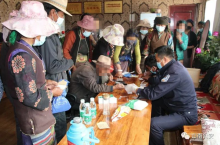By Emile Dirks
Key Findings
- Analyzing 100 publicly available sources, we find that since June 2016 China’s police have conducted a mass DNA collection program in the Tibet Autonomous Region. Out of the 100 sources we analyzed, 44 contained figures for the number of DNA samples police had collected in particular areas of Tibet. Based on our analysis of these 44 reports, we estimate that between June 2016 and July 2022, police may have collected between roughly 919,282 and 1,206,962 DNA samples, representing between one quarter (25.1%) and one third (32.9%) of Tibet’s total population (3.66 million).
- Police have targeted men, women, and children for DNA collection outside of any ongoing criminal investigation. In some cases, police have targeted Buddhist monks. Authorities have justified mass DNA collection as a tool to fight crime, find missing people, and ensure social stability. But without checks on police powers, police in Tibet will be free to use a completed mass DNA database for whatever purpose they see fit. Based on our analysis, we believe that this program is a form of social control directed against Tibet’s people, who have long been subject to intense state surveillance and repression.
- We find that mass DNA collection in Tibet is another mass DNA collection campaign conducted under the Xi Jinping administration (2012–present), along with the mass DNA collection campaign in the Xinjiang Uyghur Autonomous Region and the police-led national program of male DNA collection.
Background on DNA Collection in China
In China under the Xi Jinping administration (2012–present), public security work is characterized by two features. The first is intensifying repression and state control, especially in areas with large ethnic and religious minority populations like the Xinjiang Uyghur Autonomous Region. The second is the expansion of invasive state surveillance over the public across China.
Both of these features are evident in the police-led mass DNA collection campaigns which have occurred under the Xi administration. Like police forces around the world, China’s Ministry of Public Security, the national police agency, has operated a forensic DNA database system since the early 2000s. As of 2018, this DNA database system contained 68 million DNA samples. DNA samples in this database are collected as part of criminal or forensic investigations. Using this database, police can compare DNA samples they collect against a larger repository of existing samples in order to determine a suspect’s identity.
But following Xi Jinping’s coming to power, China’s police have begun collecting DNA from entire populations: specifically targeting Uyghurs and other indigenous people in Xinjiang and from tens of millions of men across China.
